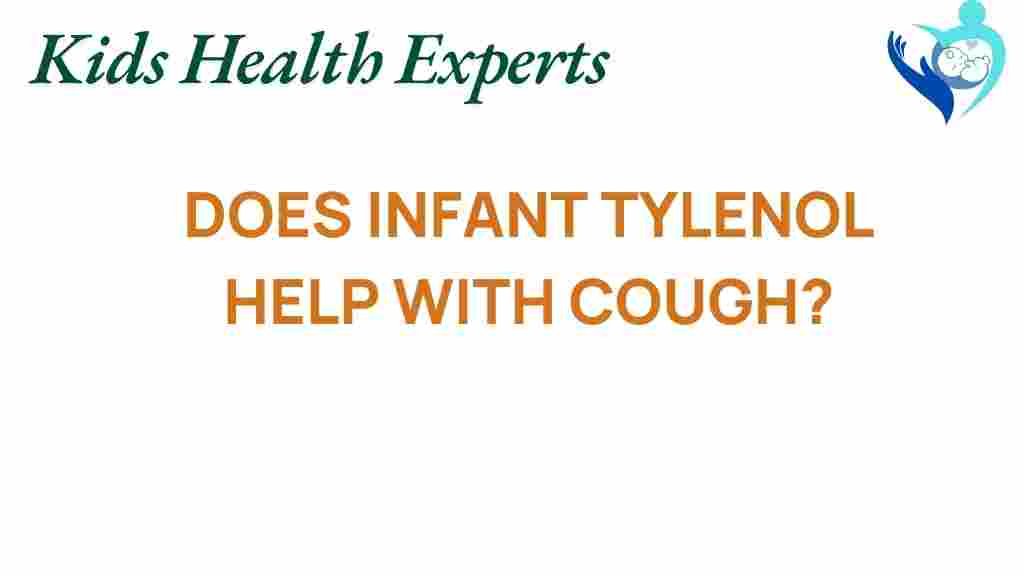The Efficacy of Infant Tylenol: Can It Really Alleviate Coughing?
As parents, the health and well-being of our children are our top priorities. When infants develop a cough, it can be distressing for both the child and the parents. One common medication often considered for infants is Infant Tylenol. In this article, we will explore the efficacy of Infant Tylenol in alleviating coughing, its role in pediatric care, fever reduction, safety concerns, and much more. By the end, you will have a comprehensive understanding of how Infant Tylenol can be a part of your cough relief strategy.
Understanding Infant Tylenol
Infant Tylenol, also known as acetaminophen, is a widely used medication for pain relief and fever reduction in infants and children. It is often recommended by pediatricians for various conditions, but many parents wonder if it can effectively alleviate coughing.
Why Do Infants Cough?
Coughing is a natural reflex that helps clear the airways of mucus, irritants, or foreign objects. Infants may cough due to:
- Common colds
- Allergies
- Respiratory infections
- Asthma
- Exposure to irritants like smoke
While coughing can be a symptom of an underlying issue, it is important to note that it is not always a cause for concern. Understanding the cause of your infant’s cough is crucial in determining the appropriate treatment.
Infant Tylenol and Cough Relief: What You Need to Know
Infant Tylenol is primarily used for pain relief and reducing fever. It does not have specific cough-suppressing properties. However, by reducing fever and associated discomfort, it may indirectly help your infant feel more comfortable, which can alleviate the cough reflex. Here’s how it works:
- Pain and Discomfort: If your infant is coughing due to a sore throat or other pain, Infant Tylenol can help relieve that discomfort.
- Fever Reduction: High fever can exacerbate coughing. By lowering the fever, Infant Tylenol may help reduce overall irritability and cough frequency.
Medication Effectiveness: The Evidence
While many parents report positive outcomes when using Infant Tylenol for cough relief, scientific evidence regarding its effectiveness specifically for cough is limited. Studies show that acetaminophen is effective in managing fever and mild to moderate pain but do not specifically validate its use as a cough suppressant.
Parents should be aware that using Infant Tylenol for cough relief should not replace seeking medical advice or treatment for underlying conditions. If your infant’s cough is persistent or accompanied by other concerning symptoms, consult a pediatrician.
Safety Concerns Regarding Infant Tylenol
When considering medications for infants, safety is a paramount concern. Here are some important points regarding the safety of Infant Tylenol:
- Dosage: Always follow the recommended dosage on the packaging or as advised by your pediatrician. Overdosing can lead to severe liver damage.
- Age Restrictions: Infant Tylenol is usually safe for infants over two months old, but consult your pediatrician if your infant is younger.
- Allergies: Ensure your child is not allergic to acetaminophen or any other ingredients in the medication.
- Consultation: Always consult with a pediatrician before administering any medication, especially if your infant has existing health conditions.
A Parents’ Guide to Using Infant Tylenol
Here’s a step-by-step guide for parents on how to safely use Infant Tylenol:
- Identify Symptoms: Determine if your infant is experiencing fever or discomfort along with coughing.
- Check Temperature: Use a digital thermometer to check if your infant has a fever (100.4°F or higher).
- Read the Label: Carefully read the dosing instructions on the Infant Tylenol packaging.
- Measure the Dose: Use the provided measuring device to ensure accurate dosing.
- Administer the Medication: Give the Infant Tylenol as directed, ensuring your child takes the full dose.
- Monitor Symptoms: Keep an eye on your infant’s symptoms after administering the medication. If symptoms persist or worsen, contact your pediatrician.
When to Seek Medical Attention
While Infant Tylenol can provide relief in certain situations, there are times when parents should seek medical attention:
- If your infant is under two months old and has a fever.
- If the cough lasts more than a few days or worsens.
- If your infant shows signs of difficulty breathing or wheezing.
- If there are any unusual symptoms, such as rash, vomiting, or extreme irritability.
Troubleshooting Tips for Parents
Parents may encounter challenges when using Infant Tylenol. Here are some troubleshooting tips:
- Refusal to Take Medication: If your infant refuses to take Infant Tylenol, try mixing it with a small amount of applesauce or juice, but consult your pediatrician first.
- Dosage Confusion: If you’re unsure about the dosage, don’t hesitate to contact your pediatrician for clarification.
- Side Effects: Monitor your infant for any adverse reactions, such as rash or unusual behavior, and consult a doctor if these occur.
Conclusion
In summary, Infant Tylenol can be a useful tool in managing fever and pain, which may indirectly help alleviate coughing for some infants. However, it is not a cough suppressant and should not be relied upon solely for cough relief. Always prioritize safety by following dosage guidelines and consulting with your pediatrician when in doubt. By understanding the role of Infant Tylenol in pediatric care, parents can make informed decisions that contribute to their child’s health and comfort.
For more information on pediatric care and medications, visit this resource.
Stay informed and always prioritize your child’s well-being!
This article is in the category Care and created by KidsHealthExperts Team
